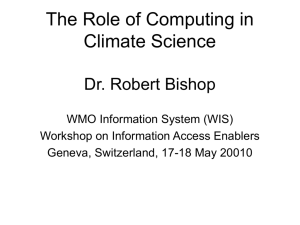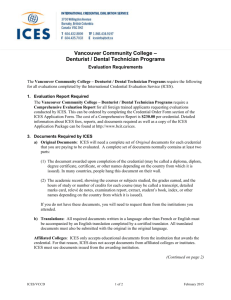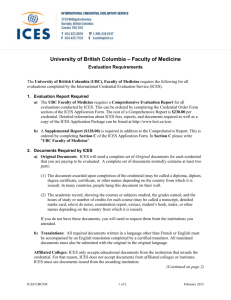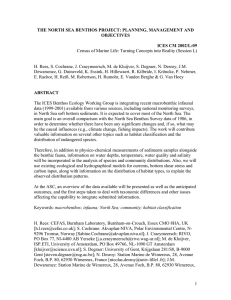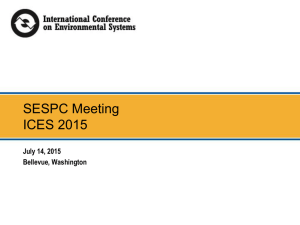Report of the Study Group on the (SGNSBP) ICES SGNSBP Report 2007
advertisement
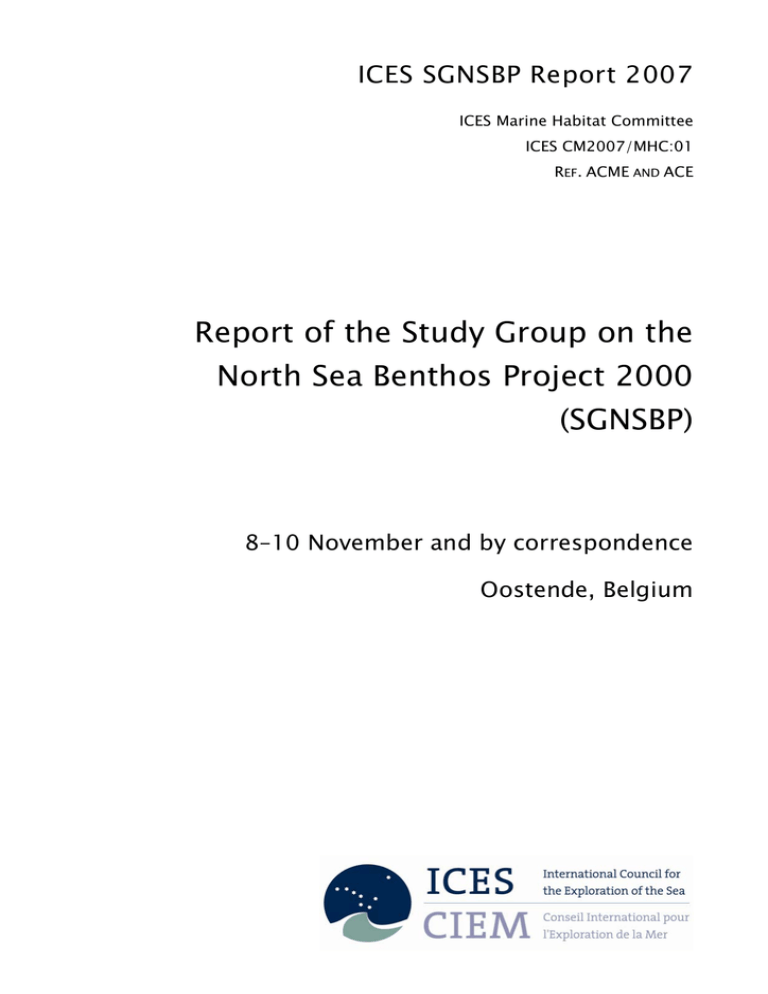
ICES SGNSBP Report 2007 ICES Marine Habitat Committee ICES CM2007/MHC:01 REF. ACME AND ACE Report of the Study Group on the North Sea Benthos Project 2000 (SGNSBP) 8–10 November and by correspondence Oostende, Belgium International Council for the Exploration of the Sea Conseil International pour l’Exploration de la Mer H. C. Andersens Boulevard 44–46 DK-1553 Copenhagen V Denmark Telephone (+45) 33 38 67 00 Telefax (+45) 33 93 42 15 www.ices.dk info@ices.dk Recommended format for purposes of citation: ICES. 2007. Report of the Study Group on the North Sea Benthos Project 2000 (SGNSBP), 8– 10 November and by correspondence, Oostende, Belgium. ICES CM2007/MHC:01. 4 pp. For permission to reproduce material from this publication, please apply to the General Secretary. The document is a report of an Expert Group under the auspices of the International Council for the Exploration of the Sea and does not necessarily represent the views of the Council. © 2007 International Council for the Exploration of the Sea ICES SGNSBP Report 2007 Contents Executive Summary ......................................................................................................... 1 1 Report of activities................................................................................................... 2 2 Complete and submit an ICES Co-operative Research Report on the structure and dynamics of the North Sea benthos (ToR a).................................. 2 3 Plan for the 2007 ICES ASC Theme Session on the outcome of the North Sea Benthos Project and related work (ToR b)..................................................... 2 4 Produce a summary of key findings and lessons for future international collaborative assessments of a comparable nature (ToR c) ................................. 2 5 Continue work towards peer-reviewed publications (ToR d).............................. 4 | i ICES SGNSBP Report 2007 | 1 Executive Summary Progress of the ICES Study Group on the North Sea Benthos Project (NSBP) 2000 was achieved mainly by correspondence, following its final annual meeting at NIOZ, Texel in April 2006. However, an inter-sessional workshop was also held at VLIZ, Ostende, in November 2006 in order to promote progress in the reporting of products arising from the analyses and interpretation of the data. The Study Group has concentrated on the production of an ICES Co-operative Research Report (CRR) and associated peer-reviewed publications. We have agreed a timetable with ICES for finalising the CRR text, in order for it to be published prior to the 2007 ICES Annual Science Conference, where a Theme Session on the ‘Structure and dynamics of the benthos in ICES waters’ is being held. This will include several papers on the outcome of the NSBP 2000. Presently (April 2007), the Study Group has completed the majority of CRR chapters and is also finalising a policy for future access to the NSBP 2000 database with the data contributors. The support of VLIZ (Belgium) for database development and maintenance proved to be invaluable to the Study Group, and this support will continue. We are also finalising guidelines on authorship and acknowledgements of NSBP products by future users, which will be deposited on the website. The work of the Study Group will be completed on publication of the CRR and the presentation of outcomes at the 2007 ICES Annual Science Conference. It is recommended that the initial planning of future sea-wide synoptic surveys of the benthos under ICES auspices (which the Study Group supports) should revert to the ICES Benthos Ecology Working Group. 2 | ICES SGNSBP Report 2007 1 Report of activities The Study Group on the North Sea Benthos Project 2000 (Chair: H Rees, UK) met intersessionally at VLIZ, Ostende, from 8-10 November, 2006, and also worked by correspondence, to address the following Terms of Reference: a) b) c) d) 2 complete and submit an ICES Co-operative Research Report on the structure and dynamics of the North Sea benthos; plan for the 2007 ICES ASC Theme Session on the outcome of the North Sea Benthos Project and related work; produce a summary of key findings and lessons for future international collaborative assessments of a comparable nature; continue work towards peer-reviewed publications. Complete and submit an ICES Co-operative Research Report on the structure and dynamics of the North Sea benthos (ToR a) A sub-group of co-authors, acting on behalf of the data contributors, met inter-sessionally in November 2006 to advance the progress of a Co-operative Research Report (CRR) entitled ‘Structure and dynamics of the North Sea benthos’. Good progress was made at this meeting and a timetable agreed for finalising products. Discussions took place with the ICES publications team and a deadline of April 16, 2007 set for submission of final drafts of all chapters, in order to ensure that the CRR would be published prior to the ICES Annual Science Conference in September, 2007 (see 2., below). In the event, the majority of authors met this deadline, and some material was submitted in advance for populating of the CRR template, which ICES has agreed to manage. A revised policy concerning future data access has been circulated to all data contributors and, once agreed, will be included in the CRR and on the NSBP 2000 website, which will receive the continued support of VLIZ. 3 Plan for the 2007 ICES ASC Theme Session on the outcome of the North Sea Benthos Project and related work (ToR b) Theme Session A (‘Structure and dynamics of the benthos of ICES waters’) at the 2007 ICES Annual Science Conference is being convened by H. Rees, S. Degraer and Heye Rumohr. During this Theme Session, a series of papers will be presented on outputs form the ICES NSBP 2000. These will be complemented by additional papers from elsewhere within the ICES community, in order to provide a broad perspective on the state of knowledge of benthic communities in relation to natural and human influences. 4 Produce a summary of key findings and lessons for future international collaborative assessments of a comparable nature (ToR c) Through the co-operation of a variety of existing data holders, and the conduct of additional sampling, the ICES NSBP 2000 sought to evaluate the status of benthic communities on an international (North Sea-wide) scale and their relationship with other biotic and abiotic ecosystem elements. As well as providing a contemporary description of the North Sea benthic communities to up-date the findings of the 1986 ICES North Sea Benthos Survey, the exercise provided important lessons for the future co-ordination and resourcing of effort to ICES SGNSBP Report 2007 | 3 facilitate such international assessments, including means to better exploit existing data from national sources. Conclusions arising from the ICES NSBP 2000 initiative are presently being finalised for inclusion in the ICES CRR, and cover: • scientific outcomes and environmental management implications (including an assessment of natural and human influences on the marine benthos) • data quality, quantity and management, and • operational implications for sea-wide collaborative assessments Several benefits for ongoing national monitoring programmes arising from periodic sea-wide synoptic surveys were identified, including the opportunity for individual countries to: • better understand large-scale changes which may be ‘hidden’ in local data sets • evaluate the effectiveness of national monitoring designs (this applies particularly to checks on the continued validity of reference stations), and hence • use the results to adapt programmes as necessary • identify stations to facilitate routine cross-referencing against the outcome of other national programmes, to place survey outcomes into a wider geographical perspective • use the results for assessing the quality and comparability of sampling and analytical work • improved targeting of influential environmental variables, hydrodynamic properties, to underpin interpretations of data especially Overall, the ICES SGNSBP 2000 identified traits of resilience and adaptability to explain patterns and changes in the benthic communities at the level of the entire North Sea and more locally, respectively, a conclusion which may be applied to the responses both to natural and human influences. The SG also concluded that the collaborative North Sea-wide exercise had been successful, despite the challenges imposed by the lack of co-ordinated international funding, and the resultant necessity for opportunistic exploitation of available data. In particular, the project provided a good illustration of the capability of ICES to address the state of the marine environment across larger spatial scales and over longer time periods than are feasible by most other organisations. Draft recommendations arising from the ICES NSBP 2000 include the following: a) b) Plan for the conduct of a co-ordinated interdisciplinary synoptic survey of the North Sea in 2010 under ICES auspices. In doing so, the following lines of inquiry should be pursued: i) identify the circumstances which might in future attract international funding for periodic sampling and analytical effort on the scale of whole sea areas ii ) review the feasibility and costs, at a national level, of a periodic uplift in sampling effort to effect a sea-wide synoptic survey consistent with the needs of ongoing national assessments iii ) alternatively, seek the support of national agencies for a comparable ICES-sponsored international assessment using data from national monitoring programmes and other sources on an opportunistic basis iv ) appraise the advantages and limitations attached to widening the time interval (e.g., 2-3 years) for completion of a synoptic survey v) identify the scope for exploiting existing ship time for North Sea sampling consider the feasibility of extending synoptic surveys into other sea areas using the North Sea benthos surveys as pilot schemes; 4 | ICES SGNSBP Report 2007 c) d) e) f) conduct integrated assessments across sea areas employing the outcomes of targeted interdisciplinary effort and parallel information from other contemporary studies; ensure long-term support for the North Sea Benthos database and establish links with the ICES and EurOBIS* databases to facilitate access by the wider scientific community, subject to agreement on a revised data policy (see a, above). (*European node of the Ocean Biogeographic Information system); provide wider access to the NSBP 2000 database through initiatives such as the EU MARBEF network, subject to agreement on a revised data policy (see 1., above); further promote the strategic benefits of regular (typically annual) surveys at representative locations, to provide a local context for interpreting any changes from intermittent larger-scale assessments. Finally, it is recommended that the initial planning of future sea-wide synoptic surveys of the benthos under ICES auspices should revert to the ICES Benthos Ecology Working Group. 5 Continue work towards peer-reviewed publications (ToR d) Authors of chapters for the ICES CRR are also working towards publication of products in the peer-reviewed literature and a number are close to submission.
